美国黑人英语及黑人文学 BLACK AMERICAN ENGLISH
- 格式:ppt
- 大小:680.50 KB
- 文档页数:75

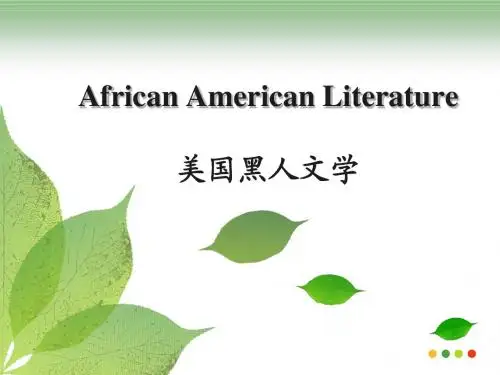


美国黑人英语的表现形式及发展因素研究作者:王啸琦刘雪丽来源:《科学大众·教师版》2021年第11期摘要:美国黑人英语作为诸多英语变体的组成部分之一,在诞生之初,其正当性和规范性就在使用标准英语的群体中激起广泛争议;然而随着美国黑人的社会地位和受教育水平提高,以及美国社会对多元文化越发包容,美国黑人英语的使用范围不断扩大,影响力也随之增强。
从最初仅由美国黑人群体使用,到如今在世界范围内广泛传播,黑人英语在漫长的发展过程中演化出了独具特色的语法特征和内涵丰富的词汇表达,并逐渐对标准英语施加其影响。
因此,了解美国黑人英语的表现形式及影响其发展的因素,已经成为英语习得及研究过程中的重要环节。
关键词:英语变体; 黑人英语; 词汇表达; 语法特征中图分类号:G112 文獻标识码:A 文章编号:1006-3315(2021)11-158-002一、引言黑人作为美国主要的少数族裔群体,其在美国的发展历史可以上溯至16世纪的三角贩奴贸易。
非洲黑人到达美国之初,只能以奴隶的身份在种植园和矿山等场所从事体力劳动。
在此过程中,来自不同地域的黑人,以及黑人与白人之间出于沟通的需要,黑人英语(Black American English,BAE)的雏形就此形成。
董启明(2009)将美国黑人英语称之为“a sort of pidgin English”(洋泾浜英语),即一种从标准英语中剥离出的简化表达。
黑人英语亦被称为Negro creole、Negro dialect以及如今的African American English等。
这种英语表达方式受到美国黑人在美国国内地位的演变,以及美国多元文化融合的影响而不断变化。
鉴于早期美国黑人的社会地位低下,能够拥有“自由人”身份的黑人寥寥无几,自然黑人的受教育权也无从谈及。
因此在一段时间内,黑人英语被主流白人社会认为是受到错误语法和下流俚语污染的“劣等英语”(郭智勇,2014)。
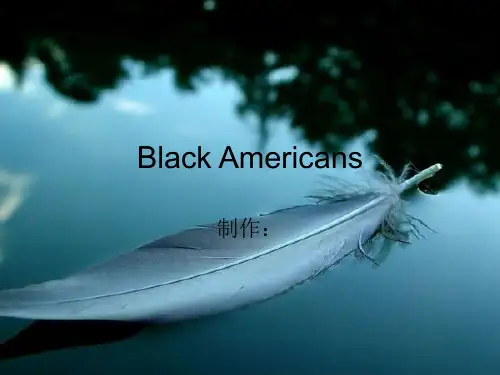
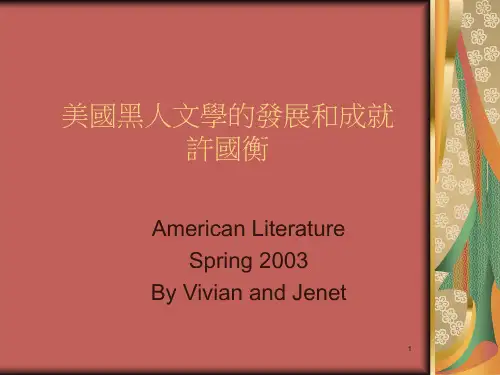
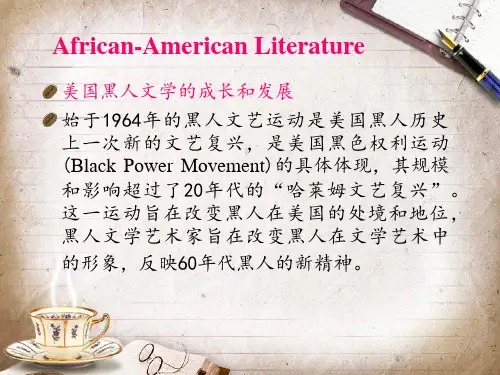
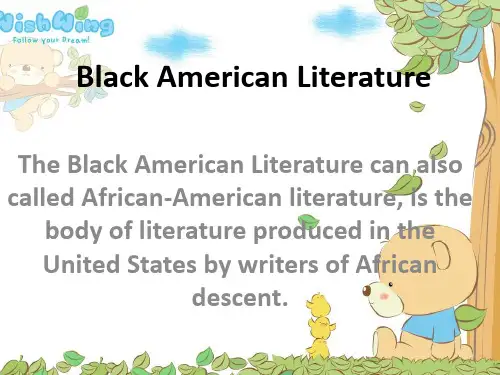
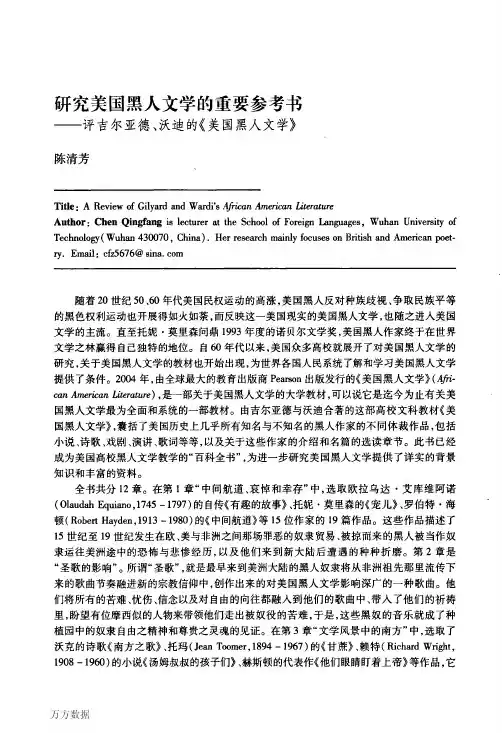
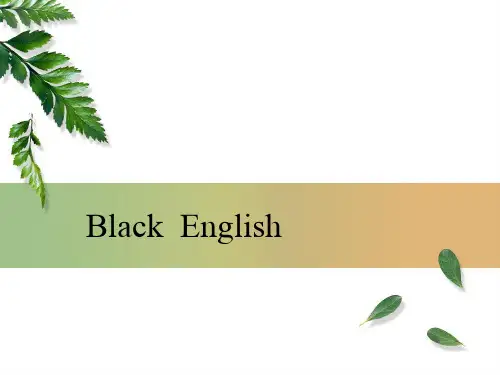
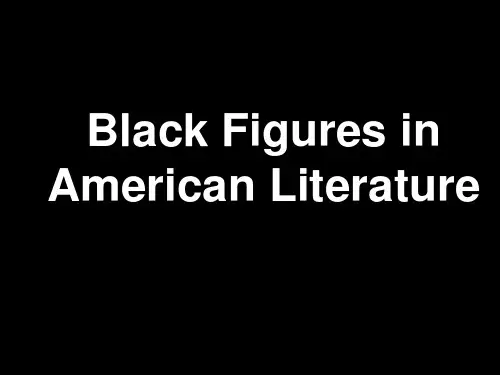
美国黑人英语的起源及其特点[摘要]近年来,展现美国黑人生活的电影和电视层出不穷,黑人英语也受到人们的普遍关注。
本文主要陈述了美国黑人英语的起源,并简单探讨黑人英语的主要特点。
[关键词] 黑人英语方言特点提到黑人英语,很多人会把它与粗俗、蹩脚等词联系起来,由于种族主义思想的影响,甚至有人认为,黑人英语只是那些没受过教育的黑人的语言,显然,这是对黑人英语的曲解。
一、黑人英语的起源关于黑人英语的起源,学术界一直存在着分歧。
但是现在大多数的语言学家都普遍认同Stewart, Dillard和Rickford(1977)的主张,他们认为黑人英语是一种克里奥尔(Creole)语,其前身是16世纪非洲西部黑人使用的洋泾浜英语(Pidgin English),因此,黑人英语可以说是―非洲化的英语‖。
16到19世纪,欧洲殖民者从非洲贩卖大批黑人奴隶到美洲,其中一半到了美国并在南部诸州的棉花、甘蔗种植场和矿山当苦工,他们大多来自非洲西部的各个部落,其语言有wolf,Hausa,Twi,Ibo,Kongo和Gola等方言。
但是,奴隶主为了防止黑人奴隶叛逃反抗,他们把这些黑人奴隶拆散、混居,以使其语言不通。
为了交流,黑人奴隶之间逐渐形成了一种掺杂一些英语词汇、彼此可以理解的洋泾浜英语。
随着时间的推移,英语的影响逐渐加深,使得黑人奴隶的语言越来越具有英语的特征,进而演变为克里奥尔语。
由于美国内战、工业革命的发展以及奴隶制的废除,黑人大量北移,尽管他们散居在北方各处,但是由于种族、阶级和社会环境等因素的影响,他们形成了一个与白人隔离的社会集团,他们所说的克里奥尔语通过长期演变逐渐形成了一种有别于标准英语的变体:黑人英语。
S•B•弗莱克斯纳指出:―黑人英语是—种地地道道的方言,是用非洲口音说英语。
为了彼此沟通,也为了适应环境,他们学会英文,并混合原有的语言和英文文法,形成了语言接触的一些特殊形式。
Black American LiteratureThe Black American Literature can also called African-American literature, is the body of literature produced in the United States by writers of African descent. It begins with the works of such late 18th-century writers as Phillis Wheatley(菲莉斯·惠特莉)and Olaudah Equiano(阿罗德·爱克伊诺), reaching early high points with slave narratives of the nineteenth century. The Harlem Renaissance(哈莱姆文艺复兴)of the 1920s was a time of flowering of literature and the arts. Writers of African-American literature have been recognized by the highest awards, including the Nobel Prize to Toni Morrison(托尼·莫里森). Among the themes and issues explored in this literature are the role of African Americans within the larger American society, African-American culture, racism, slavery, and equality. African-American writing has tended to incorporate oral forms, such as spirituals, sermons, gospel music, blues and rap.As African Americans' place in American society has changed over the centuries, so, has the focus of African-American literature. Before the American Civil War, the literature primarily consisted of memoirs by people who had escaped from slavery; the genre of slave narratives included accounts of life under slavery and the path of justice and redemption(救赎)to freedom. At the turn of the 20th century, non-fiction works by authors such as W. E. B. Du Bois(杜波依斯William Edward Burghardt Du Bois)and Booker T. Washington(布克·华盛顿)debated whether to confront or appease racist attitudes in the United States. During the American Civil Rights movement, authors such as Richard Wright(理查德·怀特)and Gwendolyn Brooks(格温多琳·布鲁克斯)wrote about issues of racial segregation and black nationalism. Today, African-American literature has become accepted as an integral part of American literature, with books such as Roots: The Saga of an American Family by Alex Haley(亚历克斯·哈利), The Color Purple (1982) by Alice Walker(艾丽斯· 沃克), which won the Pulitzer Prize(普利策奖); and Beloved by Toni Morrison achieving both best-selling and award-winning status.In broad terms, African-American literature can be defined as writings by people of African descent living in the United States. It is highly varied. African-American literature has generally focused on the role of African Americans within the larger American society and what it means to be an American. As Princeton University(普林斯顿大学)professor Albert J. Raboteau has said, all African-American study "speaks to the deeper meaning of the African-American presence in this nation. This presence has always been a test case of the nation's claims to freedom, democracy, equality, the inclusiveness of all." African-American literature explores the issues of freedom and equality long denied to Blacks in the United States, along with further themes such as African-American culture, racism, religion, slavery, a sense of home,and more.Characteristics and themesAfrican-American literature has been created within the larger realm(领域) of post-colonial literature (后殖民文学), although scholars distinguish between the two, saying that "African American literature differs from most post-colonial literature in that it is written by members of a minority community who reside within a nation of vast wealth and economic power."African-American oral culture is rich in poetry, including spirituals, gospel music(福音音乐), blues and rap. This oral poetry also appears in the African-American tradition of Christian sermons, which make use of deliberate repetition, cadence(节奏)and alliteration. African-American literature—especially written poetry, but also prose—has a strong tradition of incorporating all of these forms of oral poetry. These characteristics do not occur in all works by African-American writers.Some scholars resist using Western literary theory to analyze African-American literature. As the Harvard literary scholar Henry Louis Gates, Jr.(小亨利‧路易斯‧盖茨)said, "My desire has been to allow the black tradition to speak for itself about its nature and various functions, rather than to read it, or analyze it, in terms of literary theories borrowed whole from other traditions, appropriated from without." One trope common to African-American literature is Signification. Gates claims that signifying ―is a trope in which are subsumed several other rhetorical tropes(修辞比喻), including metaphor, metonymy(转喻), synecdoche (提喻), and irony, and also hyperbole(夸张法)an litotes(曲言法), and metalepsis(进一步转喻法).‖ Signification also refers to the way in which African-American ―authors read and critique other African American texts in an act of rhetorical self-definition‖HistoryEarly African American literatureAfrican American history predates the emergence of the United States as an independent country, and African-American literature has similarly deep roots.Lucy Terry(路西特里)is the author of the oldest known piece of African-American literature: "Bars Fight". Although written in 1746, the poem was not published until 1855, when it was included in Josiah Holland's History of Western Massachusetts(马萨诸塞州).The poet Phillis Wheatley(菲莉斯·惠特莉) (1753–84) published her book Poems on Various Subjects in 1773, three years before American independence. Born in Senegal(塞内加尔), Wheatley was captured and sold into slavery at the age of seven. Brought to America, she was owned by a Boston merchant. By the time she was sixteen, she had mastered her new language of English. Her poetry was praised by many of the leading figures of the American Revolution, including George Washington, who thanked her for a poem written in his honor. Some whites found it hard to believe that a Black woman could write such refinedpoetry. Wheatley had to defend herself in court to prove that she had written her work. Some critics cite Wheatley's successful defense as the first recognition of African-American literature.Phillis Wheatley William Wells Brow Our NigAnother early African-American author was Jupiter Hammon (1711–1806). Hammon, considered the first published Black writer in America, published his poem "An Evening Thought: Salvation by Christ with Penitential Cries" as a broadside in early 1761. In 1778 he wrote an ode to Phillis Wheatley, in which he discussed their shared humanity and common bonds. In 1786, Hammon gave his "Address to the Negroes of the State of New York". Writing at the age of 76 after a lifetime of slavery, Hammon said, "If we should ever get to Heaven, we shall find nobody to reproach us for being black, or for being slaves." He also promoted the idea of a gradual emancipation(释放)as a way to end slavery. Hammon is thought to have been a slave until his death. His speech was later reprinted by several abolitionist groups(废奴组织).William Wells Brown (1814–84) and Victor Séjour (1817–74) produced the earliest works of fiction by African-American writers. Séjour was born free in New Orleans(新奥尔良)and moved to France at the age of 19. There he published his short story "Le Mulâtre" ("The Mulatto"黑白混血儿) in 1837. It is the first known fiction by an African American, but as it was written in French and published in a French journal, it had apparently no influence on later American literature. Séjour never returned to African-American themes in his subsequent works. Brown, on the other hand, was a prominent abolitionist, lecturer, novelist, playwright, and historian in the United States. Born into slavery in the South, Brown escaped to the North, where he worked for abolitionist causes and was a prolific writer. Brown wrote Clotel; or, The President's Daughter (1853), considered to be the first novel written by an African American. It was based on the persistent rumor that president Thomas Jefferson had fathered a daughter with his slave Sally Hemings(塞利·海明斯). The novel was first published in England.The first African-American novel published in the United States was Harriet Wilson's Our Nig (1859). It expressed the difficulties of lives of northern free Blacks.。
黑人英语起源与发展研究中的若干问题作者:郭智勇潘洁来源:《语文学刊》 2013年第11期郭智勇潘洁(太原科技大学外国语学院,山西太原030024)[摘要]对黑人英语起源和发展的研究在过去60多年中历经多次发展、变化,但研究者仍未达成共识。
通过回顾黑人英语理论研究的历史,通过识别研究中面临的三大问题,本文试图阐明学者对黑人英语研究感到困惑的原因,以期能够对未来研究提供帮助。
[关键词]黑人英语;语言起源;语言发展[中图分类号]G112[文献标识码]A[文章编号]1672-8610(2013)11-0038-02黑人英语是美国早期奴隶制度的直接产物。
黑人英语的英文名称历经NegroEnglish、BlackEnglish、Ebonics、AfricanAmericanEnglish的变化,最终固定为AfricanAmericanVernacularEnglish。
因为受制于各种因素,对黑人英语起源与发展的研究尚无权威定论,甚至还存在着重大分歧。
一、黑人英语起源与发展研究的变迁美国语言学家对黑人英语的起源和早期发展的研究在过去60多年里经历了几个重要的阶段。
1.20世纪中期的“英国英语起源假说”(Anglicisthypothesis)认为,黑人英语本质上源自英国英语。
这一观点得到美国方言学家的普遍认同。
这些学者同时认为,现在的黑人英语与美国南方农村地区白人使用的语言完全相同。
Kurath、McDavid和McDavid或许最能代表方言学家的观点:“总的来说,南方黑人使用的语言是其所在地、与其有着相同教育背景的白人使用的语言……就未受过教育的黑人而言,他们说的英语和未受过教育的白人说的英语几无差别。
也就是说,黑人英语表现出和白人英语一样的区域差异和局部变化。
”[1]“……我们都认为,黑人英语中的大量词汇、语法和语音体系是从与黑人接触的白人群体使用的语言中借用的。
当这种接触到达一定程度,黑人使用的语言就完全是当地标准英语。
Characteristics of Black EnglishName:刘波Class: English 1421.IntroductionAfter reading the book Gone with the Wind and searching for information about Black English online, I have known something about it. Black people lived as slaves before the American Civil War and now live free. There are great differences between Black English and English and difficulties about understanding Black English, which attracts many scholars to do research on Black English.2.Characteristics2.1pronunciationHere are some aspects about it.Firstly, it is the deletion of /a/. Many Black speakers delete /a/, e.g: saw-sore, fort-fought Secondly, the loss of /l/ at the end of some words sometimes is replaced by the sound /w/. For example, “I can help you.” can become “ I can hep you.” [冯红变,2004:20]Thirdly, the consonant is omitted. E.g: fact—fac, .Fourthly, ““th” is sometimes replaced by t, d, f, v. “[张文婷,2012:7]For example, “thin—tin, that—dat, mother—muvah. neither—needer[ˈniːðər]—[‘ni:də]” [冯红变,2004:20]Fifthly, consonant clusters will be simplified. Some consonants are to be omitted when they are at the end of a word, especially if the cluster ends with /t/, /d/, /s/ or /z/. Sixthly, vowels added by “ng”/ŋ/, such as sing, thing, ring, etc, they are often pronounced into “ang”.Seventhly, some vowels are omitted. E.g: point-pint2.2vocabularyIn Black English, the spelling is based on the pronunciation. For example,“like-lak, business-bizness, African—Affrikun.”[Margaret 2009, p.506] Besides, there are no changes in verb person and number. For example,” he do the same thang they do. Two cats- two cat”.[周文蕊,2001:7] Then some consonants are replaced by ‘. For example,” when—w’en, and-an’” [Margaret 2009, p.506] There are some exceptions: “to-ter, insult-‘sult, I-ah ……”[Margaret 2009, p.506]2.3grammarIn Black English, the simplified words and sentences are used. For example: What goes around comes(whatever you do to someone will always come back to you). Next, they usually use the opposite words to express their meaning. For example, they use love to express their hate. Besides, the English sentence ofdouble negation is usually used. For example, nobody knows anything. I don’t say nothing.Next, whatever the form of the subject is, the verb is always singular.For example, she ain’ gwine lak a mule. Finally,” it is the disappearance of the end ‘s. For example, the dog’s leg- the dog leg, he walks-he walk.”[高莉]3.ConclusionThere are many features of Black English I haven’t mentioned. I would like to emphasize that the differences among pronunciation, grammar and vocabulary. Since the development of Black English, many changes may be made to keep pace with the times. Black English is gradually combined with English. The specific boundary between Black English and English are becoming vague. Above all, Black English is part of English. We should respect their differences.Reference:[1]Margaret Mitchell Gone with the Wind [M]上海世纪图书出版社,2009.6[2]冯红变The Phonological Features of American Black English [J]山西师范大学,山西临汾,2004(20)[3]高莉,The Phonetic and Grammatical Features of American Black English [J]南通理工学院[4]周丽蕊,美国黑人英语的语音和语法特征[J]徐州教育学院,2001(16)[5]张文婷,黑人英语特征分析[J] 西安石油大学陕西西安710065,2012(7)。